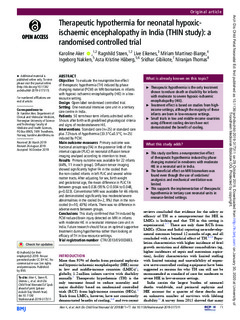Therapeutic hypothermia for neonatal hypoxic-ischaemic encephalopathy in India (THIN study): a randomised controlled trial
Aker, Karoline; Støen, Ragnhild; Eikenes, Live; Martinez-Biarge, Miriam; Nakken, Ingeborg Elise; Håberg, Asta; Gibikote, Sridhar; Thomas, Niranjan
Journal article, Peer reviewed
Published version

View/
Date
2019Metadata
Show full item recordCollections
Original version
Archives of Disease in Childhood: Fetal and Neonatal Edition 10.1136/archdischild-2019-317311Abstract
OBJECTIVE: To evaluate the neuroprotective effect of therapeutic hypothermia (TH) induced by phase changing material (PCM) on MRI biomarkers in infants with hypoxic-ischaemic encephalopathy (HIE) in a low-resource setting. DESIGN: Open-label randomised controlled trial. SETTING: One neonatal intensive care unit in a tertiary care centre in India. PATIENTS: 50 term/near-term infants admitted within 5 hours after birth with predefined physiological criteria and signs of moderate/severe HIE. INTERVENTIONS: Standard care (n=25) or standard care plus 72 hours of hypothermia (33.5°C±0.5°C, n=25) induced by PCM. MAIN OUTCOME MEASURES: Primary outcome was fractional anisotropy (FA) in the posterior limb of the internal capsule (PLIC) on neonatal diffusion tensor imaging analysed according to intention to treat. RESULTS: Primary outcome was available for 22 infants (44%, 11 in each group). Diffusion tensor imaging showed significantly higher FA in the cooled than the non-cooled infants in left PLIC and several white matter tracts. After adjusting for sex, birth weight and gestational age, the mean difference in PLIC FA between groups was 0.026 (95% CI 0.004 to 0.048, p=0.023). Conventional MRI was available for 46 infants and demonstrated significantly less moderate/severe abnormalities in the cooled (n=2, 9%) than in the non-cooled (n=10, 43%) infants. There was no difference in adverse events between groups. CONCLUSIONS: This study confirmed that TH induced by PCM reduced brain injury detected on MRI in infants with moderate HIE in a neonatal intensive care unit in India. Future research should focus on optimal supportive treatment during hypothermia rather than looking at efficacy of TH in low-resource settings. TRIAL REGISTRATION NUMBER: CTRI/2013/05/003693.
